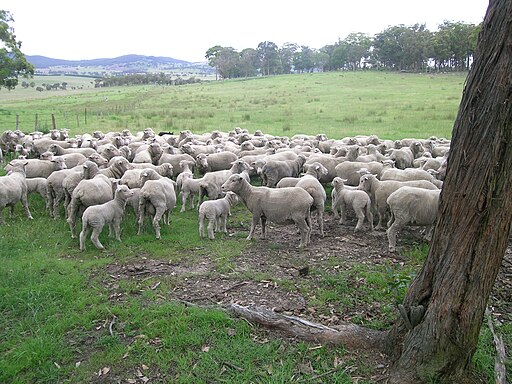Do you sell British wool?
As a British company we use and sell a LOT of British wool - primarily Bluefaced Leicester which is found in our Milburn, Bowland and Harewood yarns. (For more background on how Milburn came to be have a read of THIS blog post). BUT we do also use and sell a lot of merino. Why? Well, put simply it ticks different boxes to our BFL yarns, and when it comes to choosing yarn I like to try and go for ticking boxes - that’s the pragmatist in me.
Which boxes does merino tick? It is super soft in a completely different way to BFL; merino has a very smooth softness, so we find that people whose skin is very sensitive to wool can often manage with our merino, especially if it’s got silk in as that just makes it even smoother.
Because we use highest quality merino wool, it’s also nice and strong and wears well. Like with all types of wool, merino can vary hugely in quality which can be determined by the diameter of the fibre used, measured in microns, but more on that later on. We only use the good stuff and it costs more but I’d rather use it and pay more than use cheaper stuff. If I’m going to spend ages knitting or crocheting a garment I want it to look gorgeous for as long as possible, and that’s aided by using good quality wool. My general motto is: If I wouldn't use it myself, I won't sell it!

Reasons to love BFL
- The wool is fine and dense making it hardwearing;
- The fibres do not have scales on the surface like other wools do, giving it a lustrous appearance;
- It is compared in character to mohair and alpaca due to its diameter of 25-26 microns;
- It spins, felts and dyes beautifully;
- Soft enough to be worn next to skin;
- It's a British wool;
- Good stitch definition.

How does BFL compare to merino?
Our merino and Bluefaced Leicester are both the highest quality of those types of fibres so production quality is comparable. Bluefaced Leicester wool is a lustre wool which means it is strong, shiny, and soft, as I am sure you can see in Milburn 4ply and DK. People often think that our pure BFL yarns have silk in just because the wool is so naturally lustrous. Merino is soft, smooth, and less shiny than Bluefaced Leicester; it's better for people with sensitive skin due to the smoothness. They are both very different fibres but we love them equally!

Reasons to love merino
- Our merino is cruelty free (see THIS blog post) and good quality which feels nicer to knit/crochet with;
- It knits beautifully, shows patterns and stitches well;
- It holds its shape;
- It is warm;
- Has all the benefits of wool without being itchy;
- Is squidgy and bouncy in your hands and slides off the needle (in a good way!);
- It is hard wearing;
- Softness;
- Ease of wear;
- Comfort;
- Doesn’t split/unwind when knitting;
- It takes colours well and keeps them over the years;
- It doesn’t leave ‘fluff’ on black clothes;
- It is fun to say 🤣

What is the difference between merino and extrafine merino?
The majority of our merino yarns are extrafine merino, this is so called as it is 19.5 microns (the diameter of wool fibre is measured in microns and the smaller the number the finer the wool). Tempo 4ply (our toughest sock yarn) also uses merino but the fibre is less fine, at 27 microns, making it much more hard wearing but not as smooth and soft. However, it ticks different boxes, so we feel it is still a valuable addition to our collection. It is soft enough for most people to wear next to their skin, but not as soft as our Pendle and Titus yarns.
Why use Superwash?
Superwash wool is wool that has been treated to prevent felting and shrinkage during the washing process, thus making it machine washable. We are pursuing organic superwash techniques and as soon as this becomes viable we will switch to that wherever possible. All wool based yarns that we produce are superwash.
Yarns in our range which do not feature sheeps wool are not superwash. This means Askham Lace, Askham 4ply, Askham Aran, Whitfell DK, Whitfell Chunky, Bedale 4ply, Eldwick Lace are not superwash as the fibre comes from alpacas, yak and angora goats.



Hi there. Do you sell a mix of blue face and merino, please? if so please would you send me a link?
Many thanks